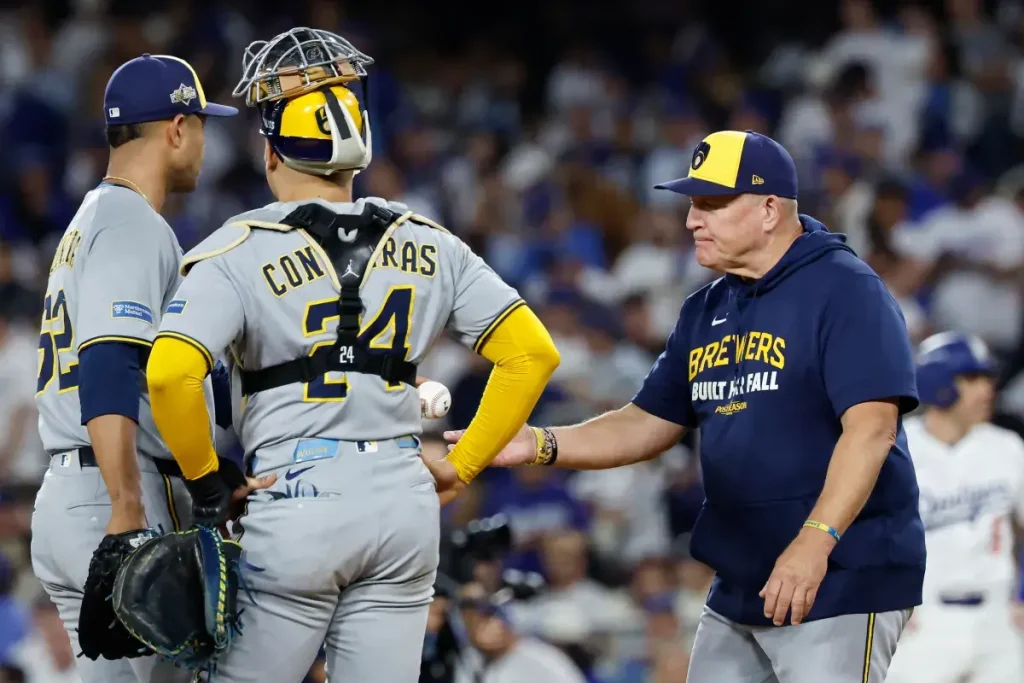Brewers’ NLCS Struggle: How Fatigue and Emotion Shaped a Sweep
In the wake of the Milwaukee Brewers’ disappointing National League Championship Series sweep at the hands of the Los Angeles Dodgers, manager Pat Murphy offered a candid assessment of his team’s shortcomings. Murphy pointed to the emotionally and physically draining five-game Division Series against the rival Chicago Cubs as a significant factor in their subsequent performance collapse. “The emotional series with the Cubs—you have to have been part of it to understand how it really zapped a lot out of us emotionally,” Murphy explained following the Game 4 defeat. This rivalry, deeply embedded in Midwest baseball culture, demanded everything the Brewers had, leaving them depleted as they faced a well-rested Dodgers squad.
The contrast in preparation between the two teams was stark and ultimately consequential. While Milwaukee was forced to navigate a full five-game series against Chicago, deploying their high-leverage relievers repeatedly in tense situations, Los Angeles had dispatched the Philadelphia Phillies in just four games. This scheduling advantage allowed the Dodgers to enter the NLCS with fresher arms and more strategic flexibility. When the Brewers suffered a deflating one-run loss at home in Game 1, it seemed to knock the wind from their sails, establishing a psychological hurdle they couldn’t overcome. “To have to come back and play right away—and then we lose a one-run game, it just took us off it a little bit,” Murphy reflected, highlighting how momentum in baseball can shift dramatically on small margins.
The offensive collapse for Milwaukee represented perhaps the most puzzling aspect of their NLCS performance. A team that had built its identity around patient at-bats, contact hitting, and efficiently manufacturing runs suddenly appeared unrecognizable at the plate. Throughout the regular season, the Brewers had excelled at wearing down opposing pitchers, drawing walks, and capitalizing on opportunities with runners on base. Yet against Los Angeles, they managed just one run in each of the four games—a stunning departure from their established offensive approach. Brewers hitters chased pitches outside the zone, failed to string together quality at-bats, and seemed to abandon the disciplined approach that had carried them through the season.
The Dodgers’ pitching staff deserves substantial credit for neutralizing Milwaukee’s offense. Starting with their rotation and extending through their bullpen, Los Angeles executed a masterful game plan against the Brewers’ hitters. As Murphy acknowledged with grudging respect, “The pitching performances by the Dodgers basically put the hammer down.” Even when Milwaukee did create occasional scoring threats, the Dodgers’ relievers proved equally capable of escaping jams without significant damage. This relentless pitching excellence forced the Brewers into increasingly desperate approaches at the plate, creating a downward spiral of offensive futility that they could never escape throughout the series.
Interestingly, while the Dodgers’ offensive performance wasn’t dominant—they frequently left runners on base and missed opportunities to deliver knockout blows—they consistently did just enough to win. In contrast to Milwaukee’s struggles, Los Angeles capitalized on hittable pitches when it mattered most, manufacturing the decisive runs in each close contest. This situational hitting proved to be the difference in a series where small advantages accumulated into an insurmountable lead. For Brewers fans, the frustration was palpable in watching their team—so effective all season at executing the fundamentals of run production—suddenly unable to generate consistent offense when it mattered most.
The series outcome raises important questions about postseason scheduling and recovery that extend beyond this particular matchup. For Milwaukee, the emotional hangover from their intense Cubs series clearly affected their performance, suggesting that the psychological dimensions of postseason baseball remain as important as physical preparation. As the Dodgers advanced to the World Series while the Brewers headed home, Murphy’s candid assessment offered both explanation and perspective: championship teams must overcome not just their opponents but also the cumulative toll of the postseason journey itself. The 2023 NLCS ultimately demonstrated how quickly fortunes can shift in October baseball, where emotional resilience, physical recovery, and execution under pressure determine which team’s season continues and which team’s dreams end abruptly.


